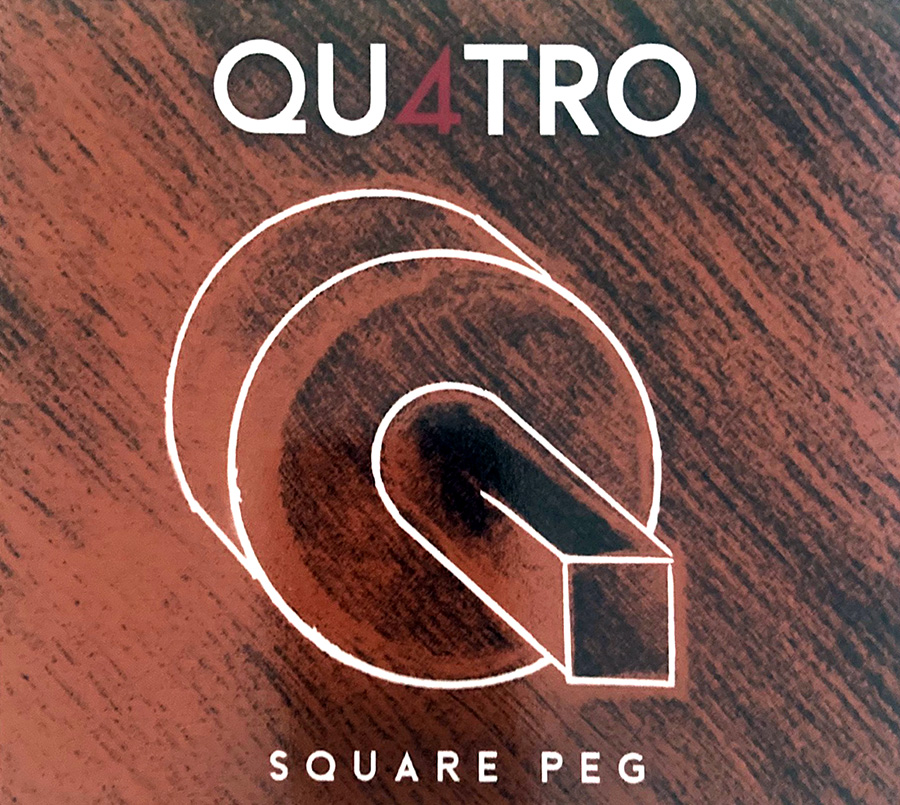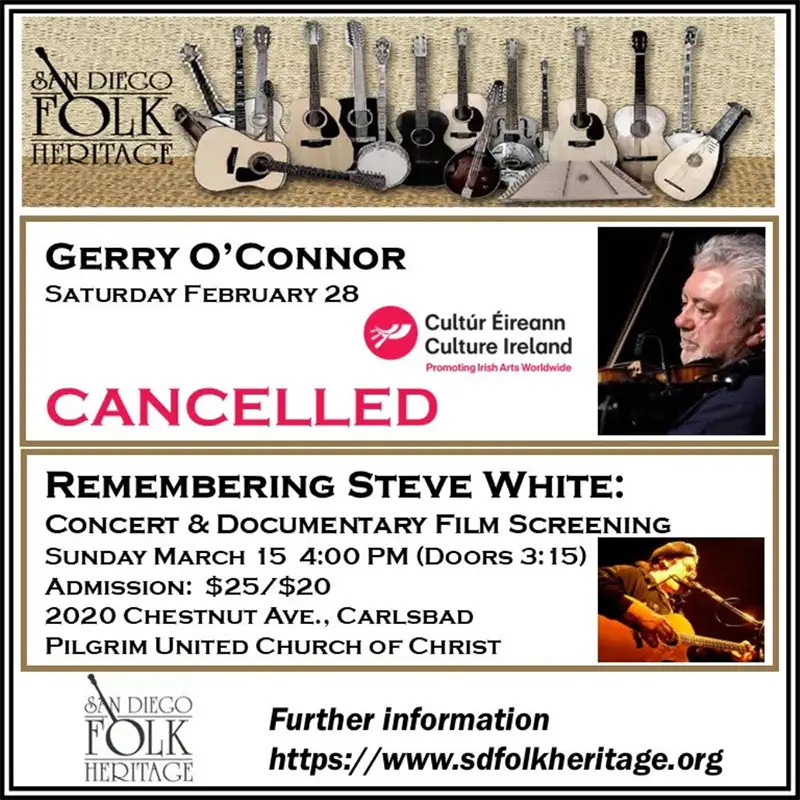CD Reviews
QUATRO: Square Peg

Produced by Quatro; recorded at Subcat Studios in Syracuse, New York; and engineered by Ron Keck, Square Peg has a vintage, early ’70s feel yet manages to arrive at a pleasing level of sophistication with 12 songs and just over 48 minutes. The four players adeptly fill out the sound; in whatever they do, they are always enough, just right. They are Chuck Schiele on guitar and lead and backing vocals, Heather Kubacki on cello and lead and backing vocals, John Dancks on double bass, and George Newton on pedal steel and backing vocals. Schiele and Kubacki share equally in singing leads and harmonies; the group has made the right choices on those assignments. I especially appreciate the expansive use of cello for both support and for solos. It creates, what I call, the sound of the soul, and the arrangements allow for Kubacki’s counterbalance of edginess and fluidity.
What follows here does not go in production order; prominence is indicative of how they struck me.
Written by Schiele and Kubacki, “Big Stuff” opens fresh as the first day of summer vacation. Guitar and pedal steel leave space for the cello to fill until Kubacki starts singing in short bursts of melody lines, and the bass becomes more prominent. At the chorus, the cello is back, and Schiele comes in on harmony, blending beautifully. And rightly so, as this is a song about togetherness, about working and dreaming together, and creating something special. At 2:06, cello begins a short solo, followed by a few lines of plucky pedal steel. The mood changes as the bridge flows like water, with longer notes and harmonies and half-step changes. It pulls like toffee, twisting and billowing up until it trips back into the last verses that build in intensity until, at 3:37, Kubacki slows to gently sing: “I dream all day, I dream all night, I dream about the way you kiss me goodbye.”
In name, this is the longest song on the album at 5:49, but it seems to end at 3:50 and then spring back up again in an instrumental outro that could easily be billed as another song. It was this two-minute portion that initially caught my attention and sat me down to really listen to the project. Beginning with guitar strumming, long notes on the cello, and light and lovely pedal steel, it feels like desire and it steadily grows. Cello and steel switch off taking the lead, bass joins in and they swell together until 4:52, when they break over the falls so sweetly that it furrows my brow and makes me cry. Yet it keeps going, and I am overwhelmed with bittersweet yet tender emotion until, finally, it settles and delicately leaves me to dream my own dreams.
“Astronaut” feels like an album cut played on FM radio back in the day; it begins dark, with finger picking on guitar, backed by pedal steel. Schiele sings: “Mother made me feel the earth, many times I kissed the dirt. Father taught me how to fly, to this day I’m spinning in the sky.” Cello comes in deep and droning for the plaintive chorus, “Love me not, fear me not. I’m just an astronaut. My brother, please do not reject my soul.” After two more verses, the bridge at 2:33 is a prolonged blend of voices mournfully singing only ohs and ahs until, at 3:00, the guitar bursts into jagged and dissonant strumming. Pedal steel is an undercurrent of one long note, a sonic wave that carries the astronaut haphazardly; it is joined by cello, thrumming and tense. At 3:49 all voices join together, shouting and repeatedly singing in exclamation, “I recommend you do not judge my soul.” At 4:13, the pedal steel solo breaks through with spontaneous and fluid strokes against a backdrop of spirited yelping. The solo spins around the voices, raising them up until a final vocal outcry abruptly ends the song. I like the differentness and contrast of this song to the others on the album.
Gospel voices sing the first line of “Yummy” in a cappella: “It’s time I make you mine,” followed by driving rhythm guitar accented with cello. Schiele asserts: “You must’ve been standing at the front of the line the day they was passing out pretty and fine.” Kubacki joins him in harmony for the chorus: “I’m going crazy, I’m going out of my mind.” Indeed, the momentum at :36 is manic. Guitar picking runs neck and neck with fiddle-like cello moves, pedal steel runs playfully over the top, cello brings us back to another quick verse and chorus, then solos at 1:42. Pedal steel takes the lead at 1:56, then welcomes back the cello at 2:08. The chorus starts up again at 2:33, and pedal steel swirls around behind the full vocals. Soon, they are starting every line with “It’s time I make you mine,” just like they began the song. But then, finally at 3:14, Schiele sings: “You’re so yummy, girl, and I think I see a sign,” and there it is, the name of the song.
The very nature of “One Wish” is childlike in its desire to make known the honest-to-goodness many things there are to wish for. A short intro of sweetly picking guitar and a swoosh of pedal steel start, then bass and lead vocals begin together in an open and simple arrangement, as Schiele sings alone: “If I had one wish, baby, I would think about it for a while. Slide into a daydream, and just let it sink in till I smile.” Kubacki joins him at the second verse on harmonies and, from that point, she doesn’t stop. At 1:16 the bridge sounds strikingly different from the verses; it swings seriously with deep cello accents—there is no more wishing, only solid declaration: “I can feel the rays of light, I can feel the heat. I can feel his mighty footsteps in my feet. And in a heartbeat, I can feel what truth and blood reveal.” The heaviness lifts at 1:41 as the vocal pair, backed by pedal steel, hums in a vintage style harmony, bringing to mind the year 1967 and Frank and Nancy, or Gene and Debbie. After another two verses, they come back to humming for the outro. I gotta say, I just love that.
Other songs include the opener “Get Down,” “One Thing to Say,” and “Señorita.” Kubacki shines wildly expressive in the vocal lead on the raucous and gritty “Dig,” which starts out big and only gets bigger. There is a great pedal steel solo at 1:43, and somewhere the line: “You’re a girl doing everything she can, but the problem is you’re still pissed off ‘cause Jesus was a man.” Well-worth-a-listen covers include “Something Stupid,” by C. Carlson Parks, and a hit single by Frank and Nancy; “Somebody Groovy” by John Phillips; “Crazy Train” by Bob Daisley, Randy Rhoads, and Ozzie Osbourne; and “Sweet Dreams (Are Made of This)” by Annie Lennox and Dave Stewart, in which Kubacki takes a hefty vocal solo—listen to it, you’ll know what I mean. In fact, listen to the whole Square Peg. The more I did, the more I couldn’t stop.








